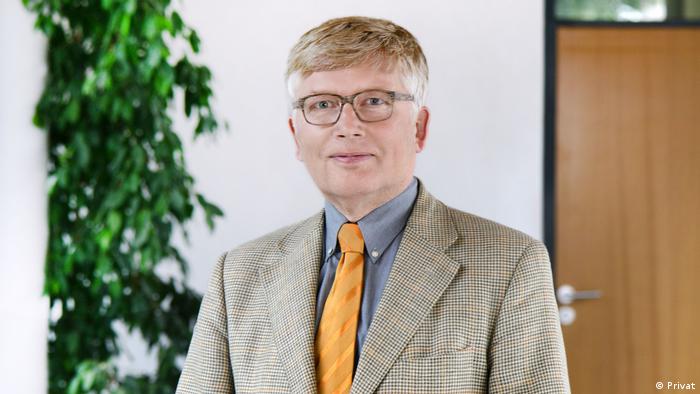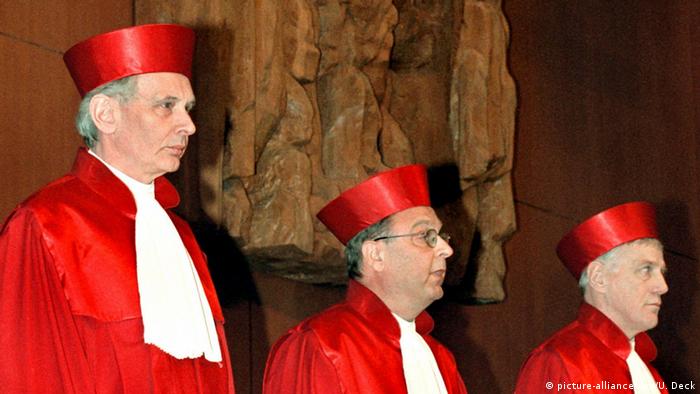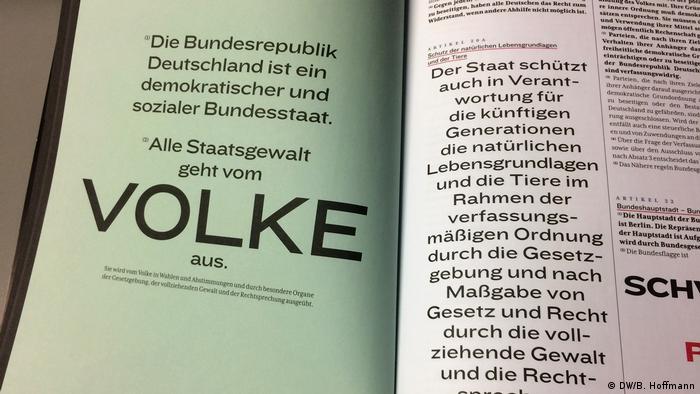Reunification, out, EU, in, the armed forces, emergency laws, the right of asylum: 63 times in 70 years the Constitution was amended international is a peak value. Should this go on? What constitutional lawyers say?

Half as long as today, the basic law (GG) was, as at 23. May 1949, entered into force. 70 years later, only approximately every second article is unchanged, says constitutional law expert Dieter Grimm. The others were added, changed or deleted and new ones added. Grimm would be the Constitution, again, scarce in focus. He conducts research on constitutional law and history, taught in the United States and was a judge at the Federal constitutional court watches over the compliance with the basic law.
Internationally Germany is in the case of constitutional changes in the top group, says Grimm, DW, “but there are countries that beat us by far”. Brazil, for example, was “a country that has infinitely changed often of its Constitution, which is a lot younger”. It is since 1988. In the USA, in contrast to most of the amendments failed in the over 200 years of constitutional history attempts. “The basic law has proved to be very flexible, especially when you compare it with the Constitution of the United States,” adds state rights activist Joachim Wieland of the University of Speyer, in the DW-Interview: “The only change in a very arduous method to. For us, this is easier.”

To Change your choice for the basic law, there is no lack. The text size has been doubled
Eternity clause: Change prohibited
In article 79, the fathers and mothers of the basic law laid down the conditions for the Changes: are Responsible as in the case of ordinary laws, the Bundestag and the länder representation in the Federal Council: for interventions at the basic law you must agree by a two-thirds majority.
The eternity clause sets limits. “In Germany, the foundations of the Constitution may not be changed,” emphasizes Wieland: “This is the commitment to the protection of the people, but also the setting that we live in a social state of law, in a democracy and in a Federal state.” It was a reaction to the Weimar Republic, which was set to slightly above the core of the constitutional boundaries. “This should not happen again,” says Wieland: “This limit is so far always been strictly observed.” Ex-constitutional court judge Dieter Grimm sums it up in short: “I love and value, the eternity clause.”
Protests against re-armament and the emergency laws
The basic law was barely in power, since the dispute first Changes began. In 1949, four years after the end of the war, the demilitarized Germany under the control of the victorious allied powers. Most of the Germans wanted after the two world wars of weapons and compulsory military service know – “without me” chanted peace activists.

Munich 1954: Not again Protest of the trade Union youth against the rearmament of Germany March –
The intensification of the East-West conflict had re-armament and the founding of the Bundeswehr then many appear as a necessary Evil. After regaining the sovereignty in 1956, was enshrined in the military Constitution in the basic law.
In 1968, tens of thousands of demonstrators dug in their heels in the “extra-parliamentary Opposition” against a major amendment to the basic law: the state of emergency laws. Especially the student movement and the trade unions fought against the “attack on democracy”. For ten years they fought to have the rules for the defence and crisis: more powers for the Federal government, restriction of fundamental rights, the deployment of the Bundeswehr. However, the memory of the national socialist dictatorship was fresh. “Nazi laws”, so cut critics of the contingency plans from.

Bonn, 1968: Also writers such as Heinrich Böll (li.) participated in the Protest against the emergency laws
Only the Grand coalition of CDU, CSU and SPD had, in 1968, the necessary two-thirds majority. For a willingness to compromise is a new law in article 20, provided Joachim Wieland says: “everyone has the right to resistance, if it is attempted, by a coup from the top, the basic law should be abolished.”
From the provisional Constitution of German
In 1949, they had made arrangements for a reunification of the two German States. Until then, the basic law should be regarded as provisional. All Germans should have the Chance to a common Constitution. In fact, the basic law survived the reunification in 1990, “largely unchanged,” noted constitutional lawyer Wieland. The prevailing idea was, “that the basic law has proved its worth, and that East Germans wanted to have exactly this order, there were in West Germany 40 years”.

State rights activist Joachim Wieland of the German University for administrative Sciences in Speyer
Article 23 for the re-unification was no longer necessary, says Dieter Grimm: “the place of Europe entered into force-article, the authorized Federal powers to the European Union.” This Trend is on the rise. So far it is about two-thirds of all GG-Changes to the regulations between the Federal government and the States, federalism: “In the course of 70 years, the Weights have more and more of the countries to the Federal moved.” But now there are “many tasks that are not self-perform in the framework of the Federal Republic of Germany”.
The right of asylum and a Large wiretapping
Rare basic rights were modified – “fortunately,” says Grimm. In may 1993, 10,000 demonstrators blocked the roads to the Bonn government quarter. They wanted to prevent the Change of the asylum law (article 16). In the Text of the 1949 short: “the Politically Persecuted enjoy the right of asylum.” This sentence explains Dieter Grimm, founded on the experience of the Nazi era, as “many Germans only survived because they found elsewhere on asylum”.

Blockage in Bonn in 1993: 10,000 demonstrators wanted to prevent politicians from changing the asylum law
The Amendment of the asylum limited right strong, be “40 times as long”. So you formulate administrative regulations, but no basic rights, criticized Grimm: “Since the Constitution takes damage, the do not want to replace the policy, but a framework is.” On the right of asylum, it is disputed until today.
One of the fundamental rights, the inviolability of the home (article 13). Accordingly, triggered plans for the interception of private living spaces, the “Great Lauscha handle” of 1998, a violent dispute. The Federal Council called on the mediation Committee, some professions have been protected. The Federal constitutional court limited the Monitoring later on.

Berlin 2000: The animal rights activists, it has succeeded, your concern in the basic law to anchor, many others failed to
“Race” – it fits the language yet?
Without major clashes, the government’s goals of environmental and animal failed protection into the basic law, other applications. At all assent to the principle of “All people are equal before the law” (art. 3), there is a growing criticism of formulations. No one should be advantaged or disadvantaged because of “his race”, for example.
A delicate point, says constitutional lawyer Wieland: “There is no race. Nevertheless, there are always people dealing with racist arguments.” If you took the word out of the Constitution, could not be misunderstood – “a difficult balancing act”. Dieter Grimm can track change requests, “but I believe that the Constitution would be the wrong place to react to it”.
Constitutional change by the Federal constitutional court
For modernization, the constitutional court judges, in addition to Changes in the GG Text. “There are few countries where a constitutional court is as powerful as the Federal constitutional court,” said constitutional lawyer Wieland. The have contributed to the fact that the Constitution is adaptable: “The basic provision of law has created to informational self-the Federal constitutional court.”
Lawyers speak of the “constitutional change”, says Ex-constitutional judge Grimm: “change through Interpretation”. In 1949, you had a feeling of electronic data processing nothing: “But of the right to free development of personality (art. 2) the Federal constitutional court that such a thing as privacy belongs.”

Guardians of the Constitution: Dieter Grimm (li.) in the red Robe of the judge at the Federal constitutional court (1999)
The basic law itself needs an Update in terms of digitisation, globalisation and Migration? In principle, conceivable, says Joachim Wieland, although a Constitution is always a little Preserving. In the case of more political groups in the Bundestag will also be more difficult to find majorities.
“A Change in the national Constitution for the question, ‘can I have the Internet, or the Migration in the handle?’ hardly anything,” says Dieter Grimm. These large challenges would have to be solved on the international level, first of all European, “even if it is more complicated”.

Show what matters – 2018, the basic law, appeared as a magazine for 10 euros. It sells well
Fundamental changes in the law change?
With a view on the successes and election law changes to the right-wing populist parties in Hungary, Poland and other countries Dieter Grimm calls for more Details on the right to vote in the basic law – primarily to the conversion of votes into mandates. Simple laws could be easily changed.
Would change Grimm preferably also, the method for fundamental changes in the law: “Here, the policy, the rules of the game itself, and remains among themselves.” His proposal: In the case of large changes to the Constitution should not only be involved in the parties “because in the Constitution – the idea – the people of the policy, the rules of the game pretends to be”.